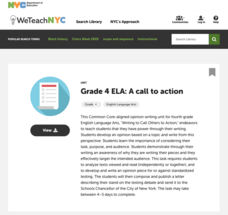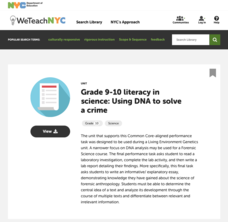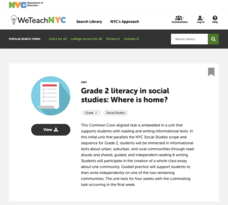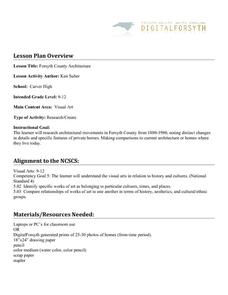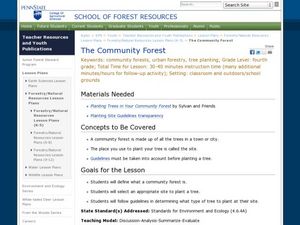Facing History and Ourselves
Making Meaning of Community
In the post-pandemic classroom, it's more important than ever to begin the school year by building a strong sense of trust and community. Using the Make Meaning and Big Paper teaching techniques, groups develop a definition of community...
Smithsonian Institution
Art to Zoo: Life in the Promised Land: African-American Migrants in Northern Cities, 1916-1940
This is a fantastic resource designed for learners to envision what it was like for the three million African-Americans who migrated to urban industrial centers of the northern United States between 1910 and 1940. After reading a...
K12 Reader
Community Connections
Who helps our community run smoothly? Read a short passage about community members and helpers. After kids finish the passage, they answer five short questions on the other side of the page.
Equality and Human Rights Commission
Learning area 4: Learn About the Meaning of Community
Scholars examine the jobs found in their community by way of surveying. After collecting data, pupils analyze their findings and share their observations with their peers. A video sparks interest. Two posters motivate participants to...
Facing History and Ourselves
Unit Assessment: From Identity to Action
Four projects enable class members to show what they have learned about ways they can stand up for democracy. to begin, individuals review their identity charts and craft a mask that represents themselves. Next, groups create a short,...
Facing History and Ourselves
Laws and the National Community
When it comes to the law, is justice always served? Teach scholars about how law sometimes enables prejudice of entire groups of people with a unit on World War II that includes a warm-up activity, analysis of primary sources,...
New York City Department of Education
Grade 4 Literacy in English Language Arts: A Call to Action
You have the power! Scholars learn that they have power of the pen in their writing. After reading and viewing various sources about standardized testing, they express their own opinions about the testing by writing letters to the...
New York City Department of Education
Grade 9-10 Literacy in Science: Using DNA to Solve a Crime
Scholars become detectives and use science to solve a crime! A complete unit introduces DNA and includes hands-on activities that have learners model DNA and extract it from different food types. A culminating activity challenges...
New York City Department of Education
Grade 2 Literacy in Social Studies: Where Is Home?
What makes a community? How communities differ? Young scholars research different types of communities, small rural towns, and large crowded cities. They respond to writing prompts, and write essays in groups to understand the wide...
Facing History and Ourselves
What Makes Memphis a Community?
Sixth graders explore the community identity of Memphis, Tennessee. After examining primary and secondary sources, class members describe the city and its attributes that make it a unique community.
Indian Land Tenure Foundation
A Sense of Belonging
In order to understand how the land changes over time because of the people who live there, learners interview an elderly person about the past. Children ask an older family member to describe what the local area was like when they were...
Curated OER
Forsyth County Architecture
What features mark a building as belonging to a particular culture, time, and place? Class members investigate the architectural movements represented in structures built in Forsyth County, North Carolina from 1880-1980 by examining...
Curated OER
Writing Classroom Agreements using Inspiration & Word to Go
How can you foster a thoughtful learning community for your class? First, the class brainstorms a list of behaviors that will help make the classroom a great place to learn. Then learners group similar ideas together and come up with...
New York City Department of Education
Grade 8 Science: Genetic Modification of Organisms
Genetic modification is a hot topic in the science and political world. A complete unit gives learners an opportunity to research genetic modification, play an interactive genetic engineering simulation, and interact with the information...
New York City Department of Education
Peter’s Garden
Watch scholars' understanding of fractions bloom. The resource presents a performance task where the fractions are equal parts from the same whole, and mathematicians must use them to solve problems about a grade level garden. Teachers...
Curated OER
The Community Forest
Fourth graders plant a tree. In this sustainable forestry lesson, 4th graders define community forest and brainstorm a location to plant a new tree on the school grounds. Students learn how to plant a tree and discuss choosing an...
Curated OER
Building Blocks of the Community
Students recognize what a community is and how those who live there work together. In this community instructional activity, students use words and blocks to create a new community. Students understand that the placement of the block...
Curated OER
What Is a Community?
Students determine ways they can help in their communities. For this community involvement lesson, students read a story that facilitates a discussion about neighborhoods and communities. Students name the communities they belong to...
Curated OER
Folk Groups and Community Folklife
Students explore folk groups and traditions in their local community. In this folklife lesson, students list the folk groups they belong to and its traditions. Students write about their favorite tradition and may complete extension...
New York City Department of Education
How I Roll
There's a high likelihood for learner success in this set of probability problems and activities. From support activities that walk learners through joint and compound probabilities through the cumulative activity of planning to win a...
New York City Department of Education
Grade 11 Literacy in Social Studies: Research Paper
The lesson guides young academics through the steps in producing a 10-page research paper on any topic in American history. Historians begin by formulating a thesis and gathering resources, then move on to creating an outline, and end...
Curated OER
Social Studies: Getting to Know You
Students in kindergarten and college students engage in dialogue designed to help them get to know each other. They meet at three discussion centers, where the students express what makes them happy, how they are seen, and how they are...
Curated OER
Lesson 2-Groups I Belong To
Second graders complete a web organizer that identifies groups I belong to, my family, my school and other groups. They describe differences among the groups and how they help each other. In addition, they present in front of the class...
Curated OER
Connecting the Dots: Workers and Their Importance
Young scholars explore the role of workers and their jobs in the community. They write a friendly letter to a community worker expressing appreciation for the work they do and their importance to the community.








